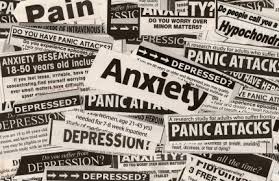Even today, anxiety and depression have been misunderstood and sometimes mistaken for each other. Recent studies have shown that they are not so different. So, in this article, we are going to discuss some of the overlapping symptoms of anxiety and depression.
Symptoms of Depression
Lack of interest: One of the common symptoms of depression is a dramatic loss of interest in activities that were once fun to depression victims.
Increase or decrease in appetite: Another symptom of depression is either an increase or a decrease in appetite. An increase in appetite may lead to severe weight gain and obesity, while a decrease in appetite can lead to drastic weight loss.
Slowing of movement: Depression can also affect thinking, body movement, and speaking. It has been noted that victims of depression are not able to express themselves. In some instances, they find it difficult to express themselves, which can ultimately lead to slow body movements. To overcome this depression related problem, one can make exercise a regular part of their routine. Making this a habit will make the individual more flexible and strong and also will keep their nervous system active.
Troubles in concentration: Most of the time, depression is intertwined with difficulties in concentrating on simple tasks. Depression can also deteriorate into severe memory loss and forgetfulness.
Suicidal tendencies: In severe cases, depression can deteriorate into suicidal inclinations. Knowing some of the signs of suicidal behaviors can help the person to seek help from the right sources.
Symptoms of Anxiety
Excessive worry: Anxiety, when left unchecked, can lead to panic disorders. Victims of this condition are likely to experience the following: severe chest pain, sweaty hands, and an irregularity in the rate at which their heart beats.
Restlessness: The second symptom associated with anxiety is restlessness. This leads to high stress levels and an increase in heartbeat. Anxiety also makes its victims worry excessively over petty issues. If this is left unchecked, this condition can deteriorate into a full-blown panic attack.
Being easily fatigued: Constant fatigue is another condition that is associated with anxiety. This is due to the fact that people who are depressed and anxious are easily fatigued because they don’t take enough rest and sleep. Seeing a therapist is one of the best ways to remedy this condition.
Muscle tension: Anxiety can affect the muscles in a number of ways. This includes muscle pain, weakness, cramps, and stiffness. A steady exercise routine can help to remedy this issue because it helps the body become more flexible and strong.
If you analyze the tips in this article, you will be able to differentiate depression from anxiety based on their symptoms. However, you may also note where some of these symptoms overlap. Positive thinking, having a good diet, and establishing a workout routine are the best ways to combat depression and anxiety.


